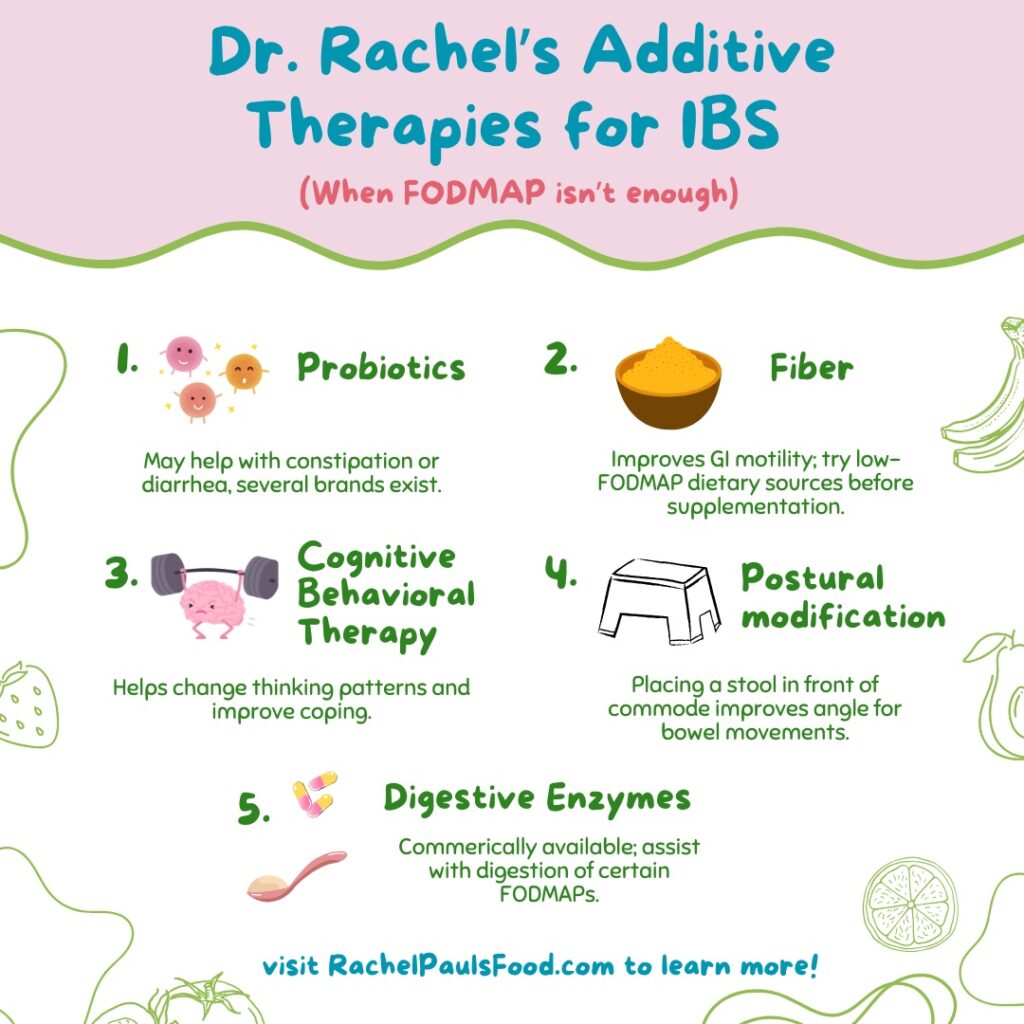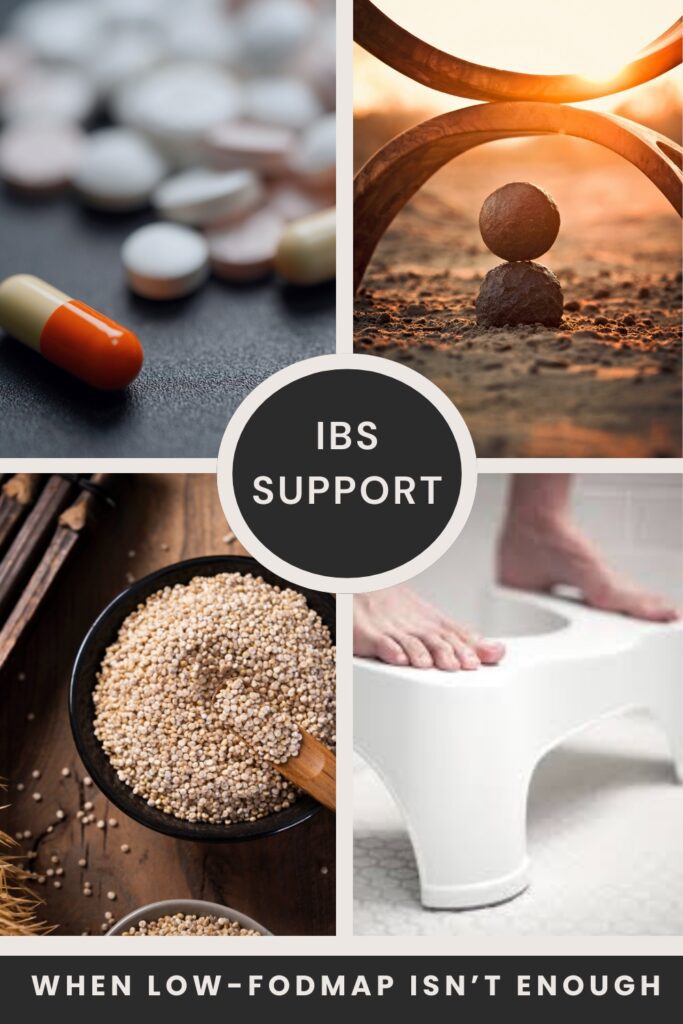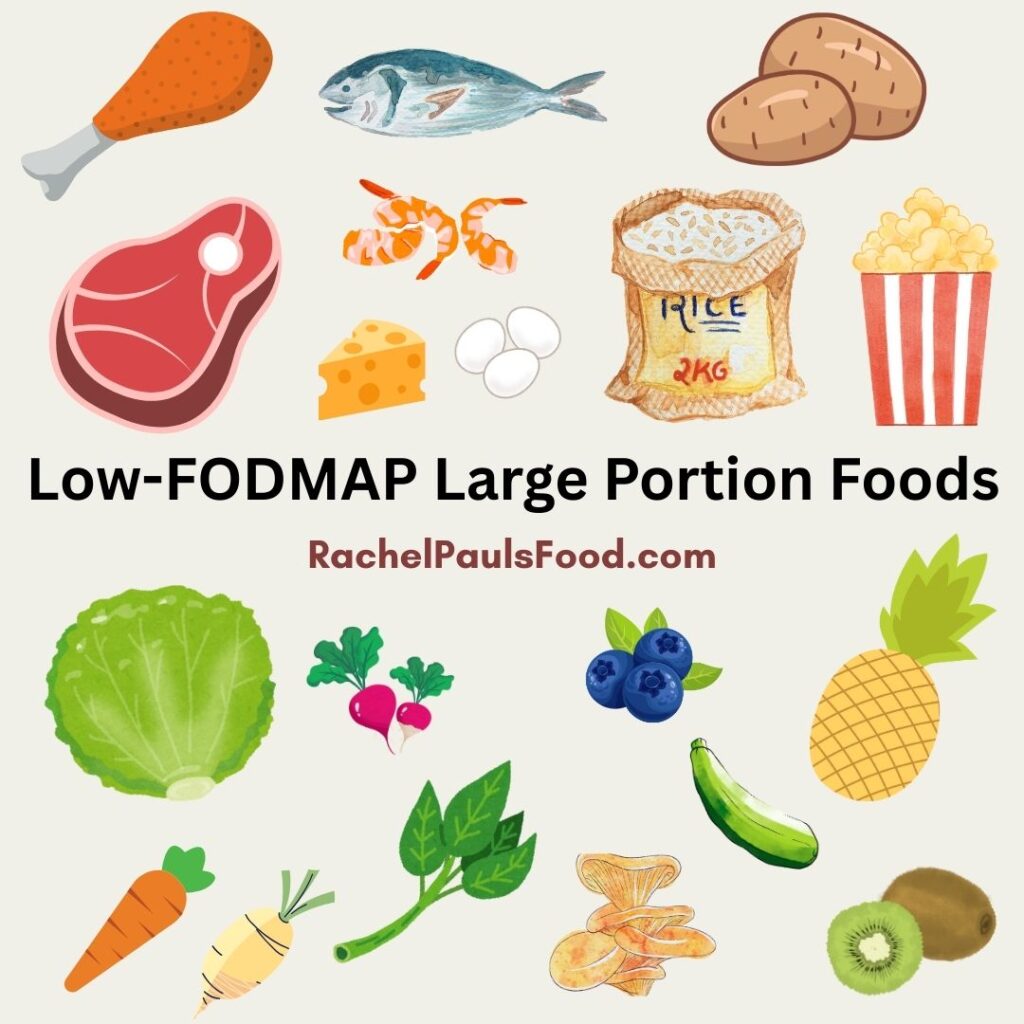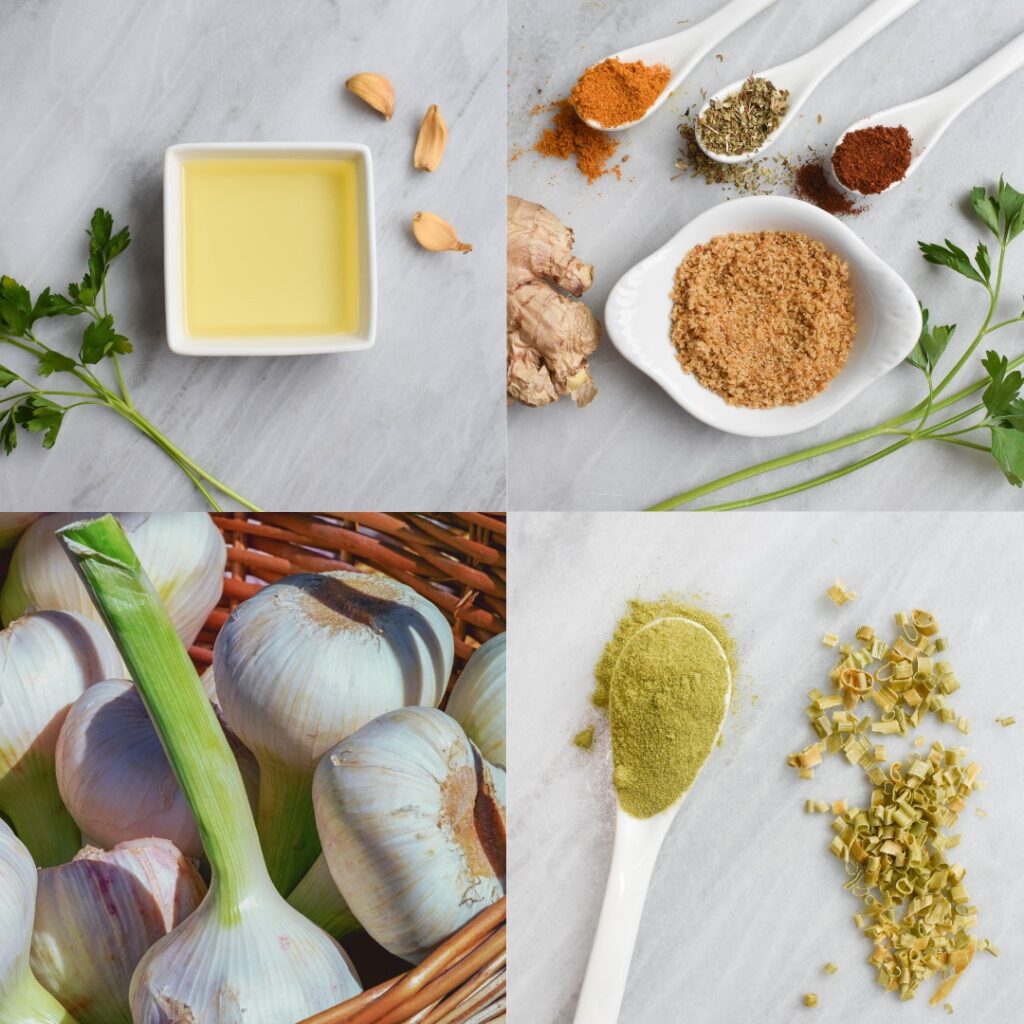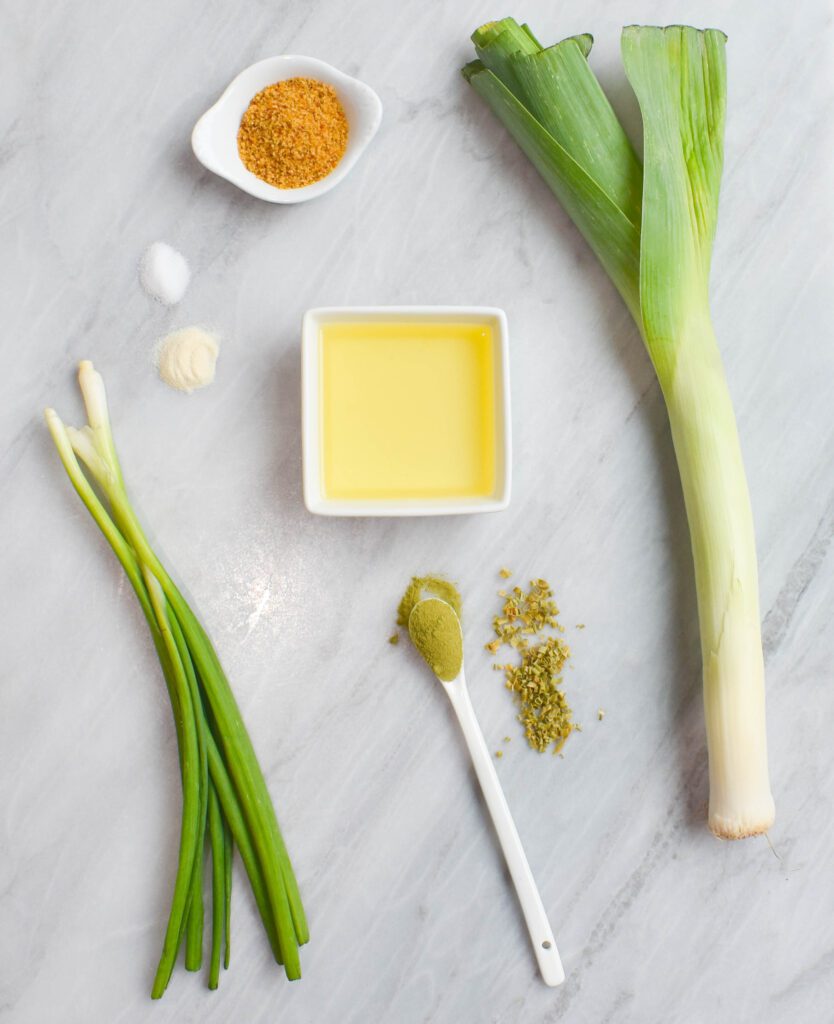The low-FODMAP diet is the number one recommended therapy for IBS and other digestive disorders.
Studies have reported up to 85% of people show improvements, with minimal long term risk. That’s correct- no risk to you, other than your time. The early research that suggested a negative impact on the gut microbiome has been debunked.
You can feel comfortable remaining on a personalized low-FODMAP diet long term.
However, there are times when the low-FODMAP diet fails, and other times when it is helpful but NOT ENOUGH.
If you are having occasional or more frequent issues, despite doing your best to follow the program, read on for additive therapies to heal your IBS.
“You can feel comfortable remaining on a personalized low-FODMAP diet long term”
Additive Treatments for IBS
Several over the counter and ancillary therapies exist to help with IBS symptoms.
Impacts include encouraging bowel function, reducing abdominal pain, enhancing digestion, and improving mental well being.
Almost all of the options I suggest have shown some benefits, although modest in certain cases. Research studies are generally limited to small sample sizes when available.
Nevertheless, feel free to give them a try, and see if they provide that extra boost you need 🙂
NOTE: I recommend completing the elimination and reintroduction phases prior to introducing the following treatments
Probiotics

A probiotic is defined as a “live microorganism” that can offer health benefits when consumed in sufficient quantities. Probiotics typically exert their effects when they make their way to the intestines and support our digestion as they pass through.
Potential probiotic benefits include reducing constipation and diarrhea, as well as improving immunity and minimizing infections.
For GI issues, the bacteria that seem to be most important are Lactobacillus, Bifidobacterium, and Bacillus.
Probiotic labels will indicate which bacteria the product contains and at what concentration (described as colony forming units, CFU). However, to date, there is no particular brand, or recommended CFU concentration, that should be ingested daily. Some probiotics can be kept at room temperature, and others require refrigeration.
A great resource to peruse available options is the Clinical Guide to Probiotic Products Available in USA (Select “Adult Health” from the drop-down menu to find their probiotic recommendations for IBS). Know that probiotics, like all over-the-counter supplements, are unregulated by the Federal Drug Administration (FDA).
If you’re shopping for a probiotic, my recommendation is to go for a nationally recognized brand. That gives you the best likelihood of quality. Be sure to read labels, and be conscious of other ingredients such as inulin in many products, which is high-FODMAP and could worsen your symptoms.
“To date, there is no particular brand, or recommended probiotic concentration, that should be ingested daily”
Cognitive Behavioral Therapy (CBT) or Hypnotherapy

Cognitive behavioral therapy and gut hypnotherapy involve a variety of techniques to change individual thinking patterns, improve coping skills, and increase confidence.
The American Gastroenterological Association has endorsed psychological interventions for patients with moderate to severe IBS who do not respond to standard medical care, or for whom psychological factors exacerbate their symptoms.
Some companies provide online audio tools for these therapies, while counselors or therapists also offer this support. The main barriers to this treatment are cost, and time commitment.
“Cognitive behavioral therapy involves techniques to change individual thinking patterns, improve coping skills, and increase confidence”
Fiber

Most of us have been told that fiber is the key to helping our IBS improve.
However, depending on the individual, it is not that simple. Type of fiber, and method of introducing it, are key to having a positive response.
Fiber may be in the foods we eat, or in supplements that we buy. Soluble fiber (such as oats and psyllium) draws water into the colon and may help constipation. Insoluble fiber (such as bran and corn) is not well digested, which stimulates bowel movements.
The recommended daily fiber intake is 21 to 25 grams for women, and 30 to 38 grams for men. Low-FODMAP fiber sources from foods include nuts and seeds, vegetables such as broccoli and potatoes, fruits such as kiwi and raspberries, and grains such as oats and quinoa.
Limited studies have evaluated the use of supplemental fiber and the low-FODMAP diet together, and a good understanding is lacking. If you do decide you want to trial fiber therapy, Psyllium (Metamucil), methylcellulose (Citrucel), calcium polycarbophil (Fibercon), wheat dextrin (Benefiber), and acacia fiber have been noted to benefit those with IBS (constipation and diarrhea). Similarly, partially hydrolyzed guar gum (PHGG) products have been FODMAP tested (Sunfiber and Regular Girl) and seem to work well in IBS-D.
Be sure to drink plenty of water with your selection. Always read labels and avoid supplements that include irritants such as inulin, chicory root extract, and bran.
“Low-FODMAP fiber sources from foods include nuts and seeds, vegetables such as broccoli and potatoes, fruits such as kiwi and raspberries, and grains such as oats and quinoa”
Problems with Poop, Pelvic Floor Dysfunction, and Prolapse
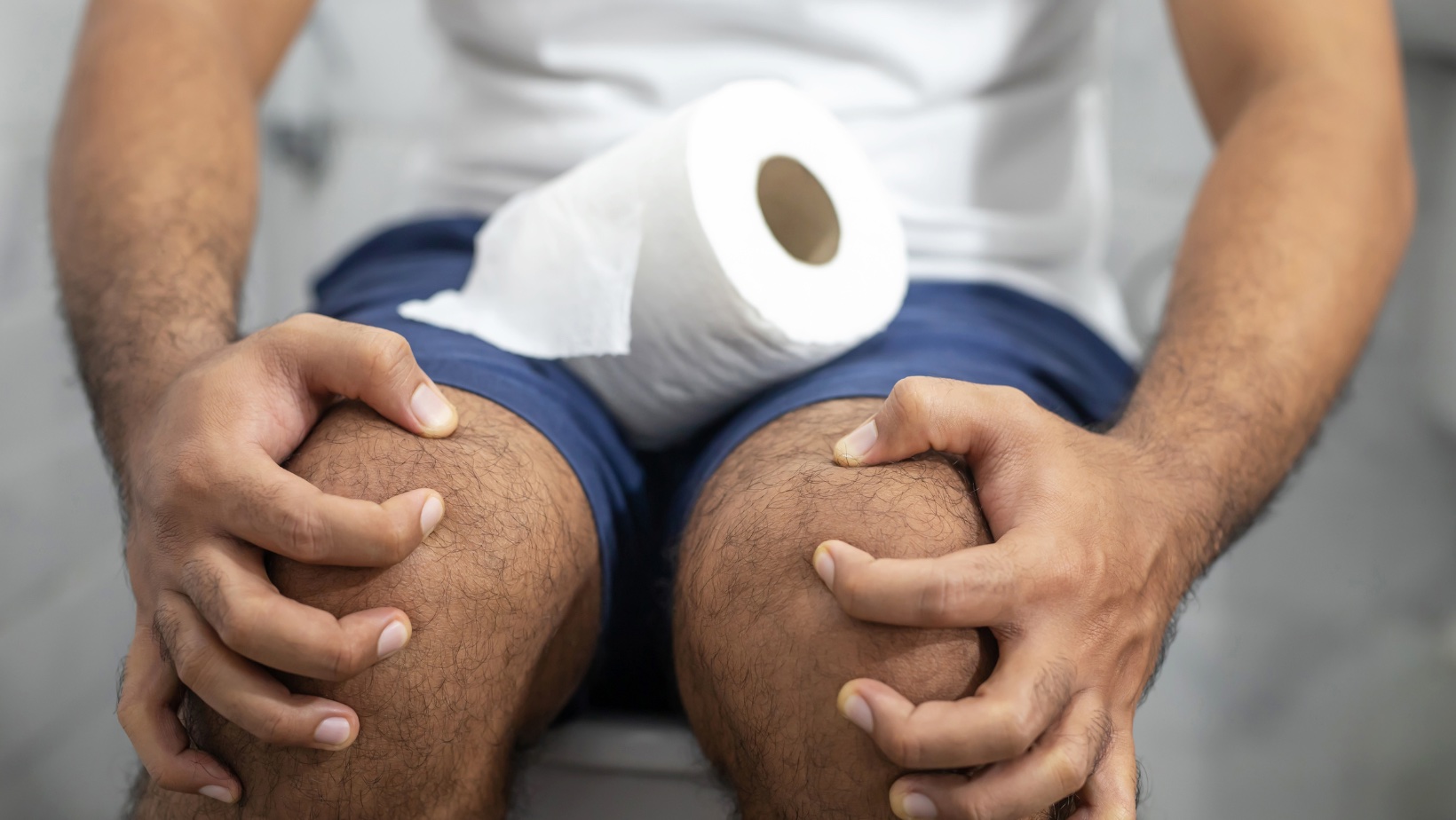
Constipation is not the only reason poop can ‘get stuck’! There may be a structural barrier, or blockage, to bowel movements.
This may be due to pelvic organ prolapse (rectocele, uterine prolapse, rectal prolapse, and/or enterocele) and/or an inability to properly relax the muscles around the rectum (pelvic floor dyssynergia).
Symptoms include incomplete emptying, straining, a need to push around the rectum to help defecate, and rectal pressure. These disorders can occur in both women and men, but are more common in females.
If you suspect you have one of these issues, then I suggest a referral to a urogynecologist (this is MY subspecialty!) or colorectal surgeon.
Beneficial treatments include pelvic floor physical therapy (yes, there are physical therapists who treat pelvic conditions), changing posture during defecation to improve stool passage (try putting your feet up on a stool in front of your commode or buy a “squatty potty”), and surgery.
These problems are common and fixable, so don’t be embarrassed to speak up!!
“Treatments include pelvic floor physical therapy, changing posture during defecation to improve stool passage, and surgery”
Digestive Enzymes

A very seductive concept. Take a pill, or mix your food with a powder, and never worry about IBS flares?!
Don’t we all wish!
But all kidding aside, enzymes hold the promise of allowing us to eat the foods we enjoy without any changes. They aren’t the answer for everyone, but could provide benefit in some cases.
Commercially available enzymes aid with the digestion of lactose, GOS, fructose, and inulin. None of the currently available products help with the digestion of polyols.
Enzymes may be swallowed at the start of a meal, or sprinkled on the triggering food. While some have undergone FODMAP certification, few have been studied in IBS patients.
Some of the downsides include portability, lack of convenience, and costs.
Feel free to try an enzyme product as a tool for use at a social gathering or other event where you can’t be in control of the menu, or for special occasions. It could increase your flexibility.
However, I don’t believe enzymes can replace a modified low-FODMAP diet on a daily basis. They are certainly not enough for me.
“Feel free to try an enzyme product as an occasional tool for use at a social gathering where you can’t be in control of the menu”
Glutamine Supplementation

Glutamine is an amino acid supplement that is available over the counter in both powder and capsule forms. It has been demonstrated to support the intestinal microbiome and improve both constipation and diarrhea.
A recent study evaluated fifty people with IBS on the low-FODMAP diet who were supplemented with 15 grams of glutamine daily, compared with placebo. The authors reported improvements in IBS symptoms, stool consistency, stool frequency, and quality of life among those who took the glutamine.
Based on this research, it may be worth considering the addition of glutamine to your daily routine. Drawbacks include expense, and the challenge of taking this three times a day.
“Glutamine may support the intestinal microbiome and improve both constipation and diarrhea”
Other Options
You may have encountered other options in your reading and research. These could include collagen supplementation, colostrum, peppermint oil, and more.
I did not include all of the above, since the evidence for these is less robust. However, I hope to update this article as research progresses 🙂
My Bottom Line
There is no silver bullet, or magic potion to cure IBS. It is about learning your body’s thresholds, what you tolerate, and what works for you.
Notwithstanding, the low-FODMAP diet plus additive therapies could be a way to make your life EVEN MORE healthy and happy.
I hope one of these options gives you that extra help you need!
Looking for other low-FODMAP diet tips? Check out these great posts:
- Dr. Rachel Talks Low-FODMAP and Mediterranean Diets; Eating for Health and a Happy Gut
- Dr. Rachel’s Top 11 Tips & Tricks for the Low-FODMAP Diet that No One Ever Tells You
- Dr. Rachel’s Top 7 Reasons the Low-FODMAP Diet Fails and How to Fix Them
- Low-FODMAP Grocery Shopping List
- Dr. Rachel’s Low-FODMAP Diet Five Day Meal Plan, Recipes and More
- Low-FODMAP Fast Food Restaurant Options; Because Low Doesn’t Mean No
- Tips for the Low-FODMAP Vegan, Vegan Food Lists and Low-FODMAP Vegetable Stock Recipe
- Low-FODMAP Free FODMAP Guide PDF
- Dr. Rachel’s Guide to the Low-FODMAP and Keto Diets; 5-Day Meal Plan, Recipes & More
For other amazing menu ideas, see over 500 FREE low-FODMAP recipes on the blog.
Be healthy and happy,
Rachel Pauls, MD

